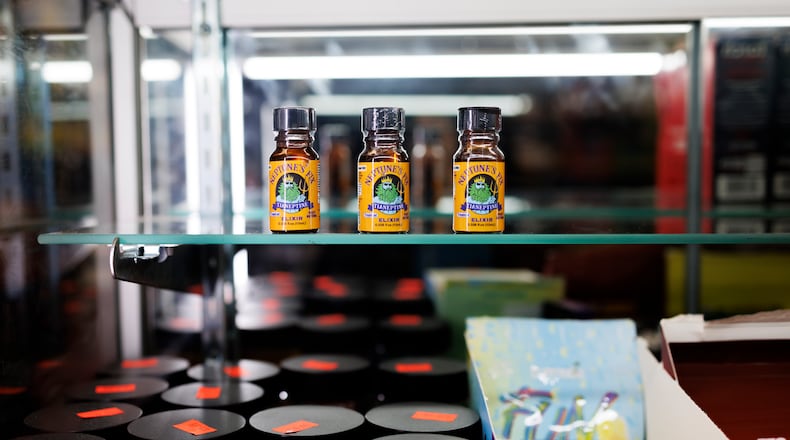The FDA is warning Americans to avoid tianeptine energy drinks and pills sold at gas stations and online because the products can be addictive, interact with prescription medications, and even cause death when consumed in large amounts.
The warning comes just days after a bipartisan group of lawmakers, including Georgia’s U.S. Rep. Rich McCormick (R-Suwanee), sent a letter to the FDA asking it to take action.
“We urge the FDA to take immediate action to research and provide guidance on tianeptine use,” McCormick and three other U.S. House members wrote. “The urgent need for FDA action on tianeptine cannot be overstated.”
Tianeptine is used in Europe, Asia and Latin America to treat depression. The drug was never approved for sale in the U.S., but it can be purchased as bulk powder from pharmacies in China. Companies based in the U.S. are adding tianeptine to herbal energy drinks and capsules sold at gas stations because tianeptine induces an opioid-like high.
Though several Southeastern states have banned products containing tianeptine, it’s still legal in at least 38 states. That worries doctors, who say people trying to quit opioids are buying tianeptine online and getting hooked.
The FDA said Americans should avoid several common tianeptine supplements, including those sold under the names “Neptune’s Fix,” “Zaza” and “Tianna Red.”
The good news is, Georgia’s May 2022 tianeptine ban appears to be working.
“In 2023, we didn’t have a single tianeptine-related call, and haven’t had any yet this year either,” Gaylord Lopez, executive director of the Georgia Poison Control Center, told the AJC.
The Georgia Poison Control Center had five tianeptine-related calls in 2020, eight in 2021, and 19 in 2022, the year the ban went into effect, Lopez said.
According to the CDC, there were 218 tianeptine-related calls made to poison control centers in the U.S. between 2000 and 2017. The centers took in 2.6 million calls in 2017.
“I am not actively going to vape shops and gas stations to see if products containing tianeptine are being sold, but calls have certainly dropped off,” Lopez said. “And that might be because of our urging the FDA to take action, and due to notifications that we have undertaken locally.”
An AJC reporter visited seven Atlanta-area gas stations, and did not see tianeptine pills or energy drinks for sale. But the products outlined in the FDA warning remain available online: a 0.34 oz shot is of Neptune’s Fix sells for $14.95 on one website, while ZaZa capsules were readily available from several sites.
In 2022, Haralson County drug agents seized 1,213 bottles of ZaZa, Tianna, and Tiara from a store in Tallapoosa, WSB-TV reported.
The fact that tianeptine remains available online worries Atlanta-area substance abuse counselors.
Tony Stanley, clinical and alumni coordinator of Hand in Hand Recovery Center in Marietta, told the AJC that some users he has treated seek a high from tianeptine, while others use it to wean themselves off opioids.
“People think they can use kratom and tianeptine to get off opioids, but that is not correct at all,” he said. Kratom is an unregulated herb that the state Legislature considered banning last year, but ultimately did not.
A study published in the journal Neuropsychopharmacology confirmed that tianeptine produces opiate-like effects.
Stanley says younger individuals who have not used heavy drugs are turning to “gas station drugs” to get a quick high. It reminds him of the emergence a decade ago of a class drugs called “spice.”
“With spice, regulators would ban one variant, and then the producers would come out with different a compound,” he said. “It’s an issue we are still dealing with.”
Tianeptine has been marketed in France as an antidepressant since 1988 under the brand name Stablon, and as a generic drug. Spain stopped selling the drug in 1999 due to addiction concerns. In 2012, France re-classified the drug as a narcotic. That same year, a report by the French government said just 0.1 percent to 0.3 percent of treated patients become dependent or addicted to tianeptine.
Researchers in the U.S. and elsewhere are studying the chemical’s potential to reduce symptoms of IBS, depression in patients living with Parkinson’s disease, and pain relief.
It’s unclear how much tianeptine is being added to the energy potions sold at gas stations. But some individuals who take tianeptine tend to consume it in large amounts. A report published in the Journal of Analytical Toxicology found that U.S. tianeptine users who had died from taking tianeptine powder consumed doses 60 times higher than what would be prescribed by doctors in France.
Tianeptine powder is sold on dozens of Chinese websites, which proport to offer three-day shipping to the U.S. In 2022, the FDA warned importers to halt tianeptine shipments at U.S. borders.
One website says tianeptine “Improves Depressive Symptoms,” and “Lessens Anxiety, Stress, and PTSD and Symptoms From Stress,” without citing any evidence. It sells the product for 90 cents per gram with same-day shipping from Shangong province, and delivery via FedEx.
The U.S. Drug Enforcement Administration says it has encountered tianeptine as bulk powder, in counterfeit pills mimicking hydrocodone and oxycodone, and in bags used to distribute heroin. The FDA has warned of its use in diet supplements.
According to the FDA, tianeptine is banned in 12 states, including neighboring states Alabama, Florida, Kentucky, Mississippi, and Tennessee.
About the Author
Keep Reading
The Latest
Featured




